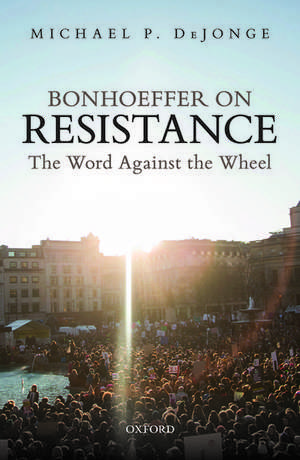Bonhoeffer on Resistance: The Word Against the Wheel
Autor Michael P. DeJongeen Limba Engleză Hardback – 30 aug 2018
Preț: 193.60 lei
Preț vechi: 225.29 lei
-14% Nou
Puncte Express: 290
Preț estimativ în valută:
37.05€ • 38.54$ • 31.05£
37.05€ • 38.54$ • 31.05£
Carte tipărită la comandă
Livrare economică 03-08 martie
Preluare comenzi: 021 569.72.76
Specificații
ISBN-13: 9780198824176
ISBN-10: 0198824173
Pagini: 184
Dimensiuni: 137 x 202 x 18 mm
Greutate: 0.29 kg
Editura: OUP OXFORD
Colecția OUP Oxford
Locul publicării:Oxford, United Kingdom
ISBN-10: 0198824173
Pagini: 184
Dimensiuni: 137 x 202 x 18 mm
Greutate: 0.29 kg
Editura: OUP OXFORD
Colecția OUP Oxford
Locul publicării:Oxford, United Kingdom
Recenzii
DeJonge lucidly retrieves Bonhoeffer's creative engagement with Luther as the engine of his resistance to the political and moral degradations of the Third Reich. Summing up: Recommended
...this is an excellent and extremely important book. There is no other book that focuses sustained attention on Bonhoeffer's theology of resistance and his activities. Teachers, students, and researchers of Bonhoeffer's works would do well to read this book carefully and refer to it often.
Michael DeJonge's Bonhoeffer on Resistance: The Word against the Wheel presents the most comprehensive, clear, and compelling study of Bonhoeffer's political theology to date.
A key takeaway from this new volume is that Bonhoeffer's conception of resistance is inescapably Lutheran. DeJonge rejects the view that Bonhoeffer left behind his Lutheran assumptions on his way to political resistance. Bonhoeffer's involvement in political resistance was, on the contrary, inextricable from his Lutheran political theology. DeJonge has made a significant contribution to Bonhoeffer scholarship in bringing this point to light, and in such a convincing and compelling way.
DeJonge has engaged in a thorough analysis of Bonhoeffer's resistance thinking. Those of us who work on the historical side of the German church struggle would do well to incorporate his and other theologians' insights into our work, to enrich our interpretations and aid us in the cultivation of an undistorted and unpoliticized interpretation of Bonhoeffer's life and work.
That said, at a time when more and more people-scholars, clergy, lay people, and activists-are looking to Dietrich Bonhoeffer for theological and ethical guidance in matters of church and civic responsibility, Michael DeJonge has offered an extremely important and helpful guide for understanding what Bonhoeffer says about resistance...I highly commend this book to both serious and casual readers of Bonhoeffer.
DeJonge, in crisp clear prose, and with deep textual acuity, has provided a definitive account of what "resistance" in a Bonhoefferian key looks like.
Michael P. DeJonge offers a nuanced and original exploration of Bonhoeffer's "resistance thinking" in its proper political, historical and theological context. This is a valuable work that reveals fascinating insights into Bonhoeffer himself and his relation to the church. It will be of deep interest to readers of theology and history alike.
Before Dietrich Bonhoeffer could be a pastor, martyr, prophet, or spy he was a theologian, and without an understanding of that theology his actions makes little sense. In Bonhoeffer on Resistance leading Bonhoeffer scholar Michael P. deJonge gives us a clear, accessible, and true account of Bonhoeffer's theology of political life, in particular its relation to Martin Luther. This is an important book which deserves to be widely read.
...this is an excellent and extremely important book. There is no other book that focuses sustained attention on Bonhoeffer's theology of resistance and his activities. Teachers, students, and researchers of Bonhoeffer's works would do well to read this book carefully and refer to it often.
Michael DeJonge's Bonhoeffer on Resistance: The Word against the Wheel presents the most comprehensive, clear, and compelling study of Bonhoeffer's political theology to date.
A key takeaway from this new volume is that Bonhoeffer's conception of resistance is inescapably Lutheran. DeJonge rejects the view that Bonhoeffer left behind his Lutheran assumptions on his way to political resistance. Bonhoeffer's involvement in political resistance was, on the contrary, inextricable from his Lutheran political theology. DeJonge has made a significant contribution to Bonhoeffer scholarship in bringing this point to light, and in such a convincing and compelling way.
DeJonge has engaged in a thorough analysis of Bonhoeffer's resistance thinking. Those of us who work on the historical side of the German church struggle would do well to incorporate his and other theologians' insights into our work, to enrich our interpretations and aid us in the cultivation of an undistorted and unpoliticized interpretation of Bonhoeffer's life and work.
That said, at a time when more and more people-scholars, clergy, lay people, and activists-are looking to Dietrich Bonhoeffer for theological and ethical guidance in matters of church and civic responsibility, Michael DeJonge has offered an extremely important and helpful guide for understanding what Bonhoeffer says about resistance...I highly commend this book to both serious and casual readers of Bonhoeffer.
DeJonge, in crisp clear prose, and with deep textual acuity, has provided a definitive account of what "resistance" in a Bonhoefferian key looks like.
Michael P. DeJonge offers a nuanced and original exploration of Bonhoeffer's "resistance thinking" in its proper political, historical and theological context. This is a valuable work that reveals fascinating insights into Bonhoeffer himself and his relation to the church. It will be of deep interest to readers of theology and history alike.
Before Dietrich Bonhoeffer could be a pastor, martyr, prophet, or spy he was a theologian, and without an understanding of that theology his actions makes little sense. In Bonhoeffer on Resistance leading Bonhoeffer scholar Michael P. deJonge gives us a clear, accessible, and true account of Bonhoeffer's theology of political life, in particular its relation to Martin Luther. This is an important book which deserves to be widely read.
Notă biografică
Michael P. DeJonge is Associate Professor of Religious Studies at the University of South Florida, where he teaches on the history of Christian theology and topics in modern religious thought. His previous publications include Bonhoeffer's Reception of Luther (2017), Bonhoeffer's Theological Formation (2012), and The Bonhoeffer Reader (co-edited with Clifford J. Green; 2014).
